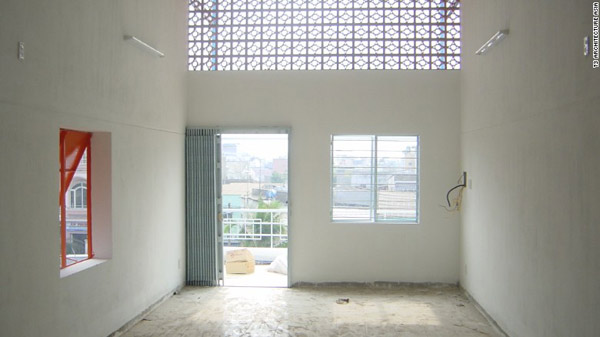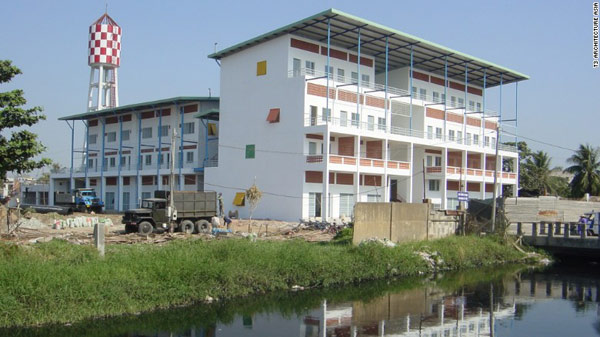當(dāng)前位置: Language Tips> 雙語新聞
The end of air conditioning? Asia architects use green solutions to cool buildings
分享到
在又濕又熱的熱帶城市,沒有空調(diào)的大樓簡直是不可想象的,但并不是每個人都可以支付得起天天開空調(diào)的費用。為此亞洲建筑師設(shè)計出了一種不用空調(diào)也涼爽的建筑,一起來看看。

Spend five minutes in humid Ho Chi Minh City and you'll probably be running for cover into the nearest air-conditioned refuge.
在悶熱的胡志明市待上5分鐘,你很可能會迫不及待地跑到最近的一個有空調(diào)的地方避暑。
In the Vietnamese city -- and many developing subtropical countries across Asia, such as Indonesia and the Philippines -- air conditioning (AC) is increasingly being considered a necessity.
在越南的這座城市,還有亞洲很多亞熱帶的發(fā)展中國家,比如印尼和菲律賓,空調(diào)越來越被視為是必需品。
But one architecture firm is advocating a different way to keep cool.
然而一家建筑公司正在倡導(dǎo)一種保持涼爽的不同方式。
T3 Architecture Asia, which has offices in Vietnam and France, specializes in back-to-basics "bioclimatic architecture", which it says could make energy-guzzling AC units redundant.
在越南和法國設(shè)有辦事處的T3亞洲建筑公司主業(yè)是回歸本原的“生物氣候建筑”,該公司聲稱這種建筑會讓大量消耗能源的空調(diào)變得多余。

By harnessing the local topography, climate, and vegetation, as well as cleverly manipulating a building's orientation, the firm can naturally create a comfortable indoor climate.
通過巧妙地利用一座建筑的朝向,以及合理利用本地的地形、氣候、植被,該公司可以自然地營造出舒適的室內(nèi)氣候條件。
Charles Gallavardin, director of T3 Architecture Asia, first forayed into bioclimatic architecture in 2005. In cooperation with the World Bank, he built an affordable apartment building in Ho Chi Minh City, which houses 350 families in an impoverished neighborhood where AC bills were to be avoided.
T3亞洲建筑公司的經(jīng)理查爾斯?嘎拉瓦丁2005年首次涉足生物氣候建筑。他在胡志明市和世界銀行合力建造了一座經(jīng)濟適用房大樓,這座可容納350戶家庭的大樓建在負(fù)擔(dān)不起空調(diào)費用的貧民區(qū)。
"You don't need to spend money on air conditioning, even in a hot climate like Ho Chi Minh, as long as your building is well designed," Gallavardin tells CNN.
嘎拉瓦丁告訴CNN說:“只要建筑設(shè)計得好,即使是在胡志明市這樣炎熱的地方,你也不需要在空調(diào)上花錢。”
Covered open-air corridors, ventilated roofs, fiber-glass insulation and the use of natural materials meant the Ho Chi Minh City units offered both natural light and ventilation.
封閉式露天走廊、通風(fēng)屋頂、玻璃纖維隔熱墻以及天然材料的使用意味著胡志明市的這座建筑擁有良好的自然光線和通風(fēng)條件。

"We try to avoid big glass facades facing east or west, because that would make the building like an oven in a tropical climate," he says.
他表示:“我們努力避免讓大面玻璃墻朝東或朝西,因為這樣會讓熱帶氣候中的建筑變成一個大火爐。”
"If you work with the main wind stream and have smart sun protection, you can do it -- you really can design buildings that need no air conditioning in a hot place like Vietnam."
“如果你利用好了主要通風(fēng)口,并巧妙地做好防曬,你就可以在越南如此炎熱的地方設(shè)計出不用空調(diào)也涼爽的建筑。”
Gallavardin explains that a typical bioclimatic T3 building is naturally about 41 Fahrenheit (22 Celsius) cooler than the outside temperature, with natural ventilation and the odd ceiling fan doing the rest of the work.
嘎拉瓦丁解釋說,典型的T3生物氣候建筑內(nèi)的自然溫度比室外溫度低41華氏度(22攝氏度),只需要自然通風(fēng)和幾個吊頂電風(fēng)扇就能保持涼爽。

Since that first project, Gallavardin has built several luxury bioclimatic hotels in Cambodia and Myanmar, a concept restaurant in Ho Chi Minh City, and even his own green office for the T3 team.
自從這第一個項目之后,嘎拉瓦丁已經(jīng)在柬埔寨和緬甸建造了幾個豪華生物氣候酒店,在胡志明市建造了一個概念餐廳,甚至還為T3團隊建造了自己的綠色辦公樓。
Other architects are also experimenting with this style of building.
其他建筑師也在嘗試這種風(fēng)格的建筑。
In Indonesia, Andyrahman Architect's Biophilic Boarding House was shortlisted in the World Architecture Festival's Building of the Year 2016 competition, praised for its perforated walls that help the building stay cool in tropical Surabaya, a congested port city in East Java.
在印尼,安迪拉曼建筑公司的親生物寄宿公寓入圍了2016世界建筑節(jié)年度建筑大賽候選名單。該公寓位于熱帶地區(qū)的泗水市,是東爪哇一個擁擠的港口城市。這所公寓憑借多孔墻讓大樓保持涼爽而受到贊賞。
In China, American architecture firm Perkins & Will took a bioclimatic approach to the new Shanghai Natural History Museum -- while the building provides air-conditioning in gallery areas to protect the artwork from humidity, it also has automated windows and skylights to naturally ventilate public areas.
在中國,美國建筑公司帕金斯威爾事務(wù)所采用生物氣候?qū)W方法設(shè)計了新的上海自然歷史博物館,盡管博物館在畫廊區(qū)開空調(diào)以保護藝術(shù)品不受潮,但是博物館也設(shè)有自動窗戶和天窗,讓公共區(qū)域可以自然通風(fēng)。
The museum saves 15% on energy consumption compared to a standard-design museum.
相比標(biāo)準(zhǔn)設(shè)計的博物館,新上海自然歷史博物館消耗的能源節(jié)省了15%。
英文來源:CNN
翻譯&編輯:丹妮
上一篇 : 明星為戲增肥又減脂 那些折騰到底值不值
下一篇 :
分享到
關(guān)注和訂閱

翻譯
關(guān)于我們 | 聯(lián)系方式 | 招聘信息
電話:8610-84883645
傳真:8610-84883500
Email: languagetips@chinadaily.com.cn